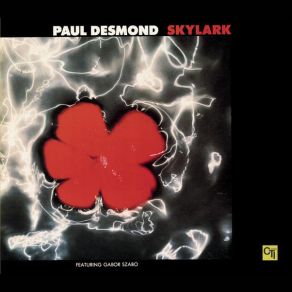Skylark
Download links and information about Skylark by Paul Desmond. This album was released in 1973 and it belongs to Jazz, Latin, Smooth Jazz genres. It contains 9 tracks with total duration of 53:23 minutes.

|
|
|---|---|
| Artist: | Paul Desmond |
| Release date: | 1973 |
| Genre: | Jazz, Latin, Smooth Jazz |
| Tracks: | 9 |
| Duration: | 53:23 |
| Buy it NOW at: | |
| Buy on iTunes $7.99 | |
| Buy on Amazon $18.89 | |
| Buy on Amazon $7.99 | |
| Buy on Amazon $29.72 | |
| Buy on Songswave €1.51 | |
Tracks
[Edit]| No. | Title | Length |
|---|---|---|
| 1. | Take Ten | 6:05 |
| 2. | Romance de Amor | 9:37 |
| 3. | Was a Sunny Day | 4:49 |
| 4. | Music for a While | 6:42 |
| 5. | Skylark | 5:18 |
| 6. | Indian Summer | 3:57 |
| 7. | Music for a While (Alternate Take) | 5:52 |
| 8. | Skylark (Alternate Take) | 5:36 |
| 9. | Indian Summer (Alternate Take) | 5:27 |
Details
[Edit]Moving over to the CTI label with Creed Taylor, Paul Desmond injects a bit of the 1970s into his sound, obtaining agreeable if not totally simpatico results. Here, the cool altoist is teamed with the progressive-slanted drumming of Jack DeJohnette (who might have been too busy a drummer for his taste), and Bob James' electric and acoustic pianos, with Ron Carter as the bass anchor, Gene Bertoncini on rhythm guitar, and, most interestingly, another individualist, Gabor Szabo, on solo electric guitar. For the first and only time, even taking into account the most inspired moments of Jim Hall, Desmond is not the most interesting soloist on his own record, for it is Szabo who most consistently draws you in with his mesmerizing incantations over vamps from the rhythm section. For those who missed it the first time, Desmond remakes "Take Ten" — without the Middle Eastern elements — "Romance de Amor" is eventually dominated by Szabo, and the inclusion of "Was a Sunny Day" proves that Desmond's involvement with the music of Paul Simon in 1970 was not a passing infatuation. Don Sebesky is credited with the "arrangements" but his orchestrating hand is not felt except for a single solo cello (George Ricci) in an adaptation of Purcell ("Music for a While"). It's a cautious change of pace for Desmond, although the fiercer context into which he was placed doesn't really fire his imagination. ~ Richard S. Ginell, Rovi